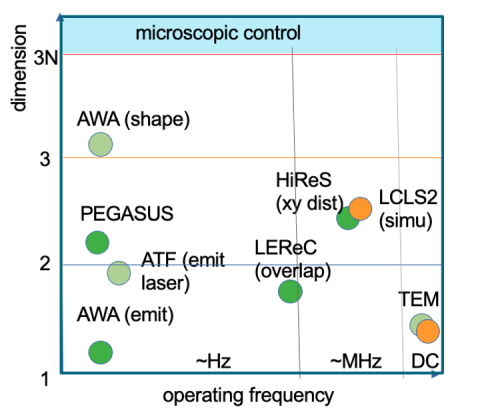Machine Learning-based live optimization of accelerators
Recently, CBB student Lucy Lin applied machine learning techniques to cooling at RHIC at BNL (LEReC). A specialized Bayesian optimization algorithm maximizes the cooling rate using a high-dimensional surrogate model trained on LEReC system simulator data. In tests, this system, which was developed in a collaboration between CBB and BNL, has automatically tuned beams to the orbit that maximizes cooling. This success makes full integration with the RHIC control system very promising.
This is just one of several CBB efforts to apply machine learning to accelerator tuning. Other target accelerators include HiReS at LBL, the Cornell Electron Storage Ring, Argonne’s AWA, and UCLA’s PEGASUS. As illustrated in the figure, the accelerators under study span a wide range of parameters and goals, affording an opportunity to probe the bounds of applicability of artificial intelligence techniques to the manipulation of beams.
References:
Y. Gao, W. Lin, K. A. Brown, X. Gu, G. H. Hoffstaetter, J. Morris, and S. Seletskiy, "Bayesian optimization experiment for trajectory alignment at the low energy RHIC electron cooling system", Phys. Rev. Accel. Beams 25, 014601 (2022) [Online] Available: https://doi.org/10.1103/PhysRevAccelBeams.25.014601
A. Scheinker, F. Cropp, S. Paiagua, D. Filippetto, "Adaptive deep learning for time-varying systems with hidden parameters: Predicting changing input beam distributions of compact particle accelerators", Phys. Rev. Accel. Beams 2102,10510 (2021) [Online] Available: arXiv:2102.10510
R. Roussel, J. P. Gonzalez-Aguilera, Y. K. Kim, E. Wisniewski, W. Liu, P. Piot, J. Power, A. Hanuka, A. Edelen, "Turn-key constrained parameter space exploration for particle accelerators using Bayesian active learning", Nature Comm. 12, 5612 (2021) [Online] Available: https://www.nature.com/articles/s41467-021-25757-3
W. F. Bergan, I. V. Bazarov, C. J. R. Duncan, D. B. Liarte, D. L. Rubin, and J. P. Sethna, "Online storage ring optimization using dimension-reduction and genetic algorithms", Phys. Rev. Accel. Beams 22, 054601 (2019) [Online] Available: https://doi.org/10.1103/PhysRevAccelBeams.22.054601
E. Cropp, P. Denham, J. Giner Navarro, E. Liu, P. Musumeci, N. Burger, L. Phillips, A. Edelen, "Maximizing 2-D Beam Brightness Using the Round to Flat Beam Transformation in the Ultralow Charge Regime", NAPAC’19/frxba4 [Online] Available: http://jacow.org/napac2019/papers/frxba4.pdf

